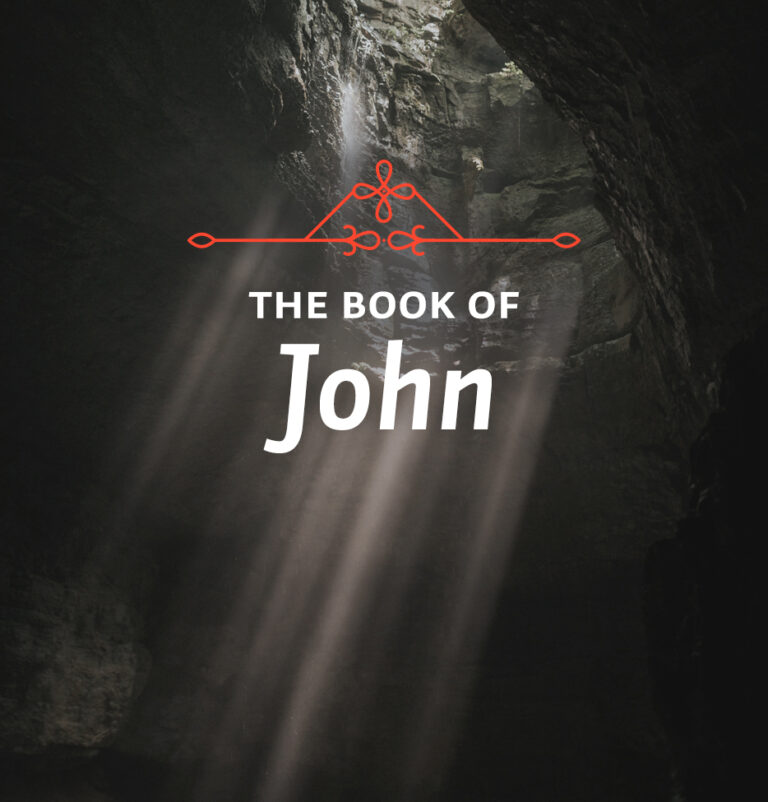
A Disciple After God’s Own Heart — Part One
A Disciple After God’s Own HeartJohn 21:1-19Theme: Yes, Lord!In this week’s lessons, Dr. Philip Ryken teaches us about restoration and obedience.
Lesson

A Disciple After God’s Own HeartJohn 21:1-19Theme: Yes, Lord!In this week’s lessons, Dr. Philip Ryken teaches us about restoration and obedience.
Lesson

A Disciple After God’s Own HeartJohn 21:1-19Theme: Yes, Lord!In this week’s lessons, Dr. Philip Ryken teaches us about restoration and obedience.
Lesson

A Disciple After God’s Own HeartJohn 21:1-19Theme: Yes, Lord!In this week’s lessons, Dr. Philip Ryken teaches us about restoration and obedience.
Lesson

A Disciple After God’s Own HeartJohn 21:1-19Theme: Yes, Lord!In this week’s lessons, Dr. Philip Ryken teaches us about restoration and obedience.
Lesson

A Disciple After God’s Own HeartJohn 21:1-19Theme: Yes, Lord!In this week’s lessons, Dr. Philip Ryken teaches us about restoration and obedience.
Lesson
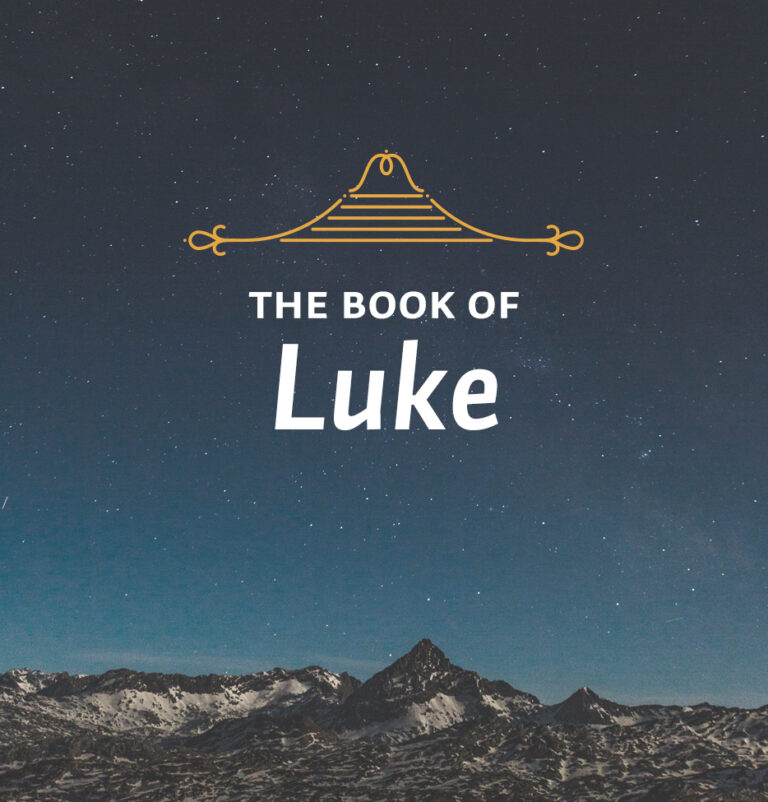
The Path of ObedienceLuke 6:46-49Theme: Profession and practice.This week’s lessons teach us how to both study and live God’s Word.
Lesson

The Path of ObedienceLuke 6:46-49Theme: Profession and practice.This week’s lessons teach us how to both study and live God’s Word.
Lesson

The Path of ObedienceLuke 6:46-49Theme: Profession and practice.This week’s lessons teach us how to both study and live God’s Word.
Lesson

The Path of ObedienceLuke 6:46-49Theme: Profession and practice.This week’s lessons teach us how to both study and live God’s Word.
Lesson

The Path of ObedienceLuke 6:46-49Theme: Profession and practice.This week’s lessons teach us how to both study and live God’s Word.
Lesson
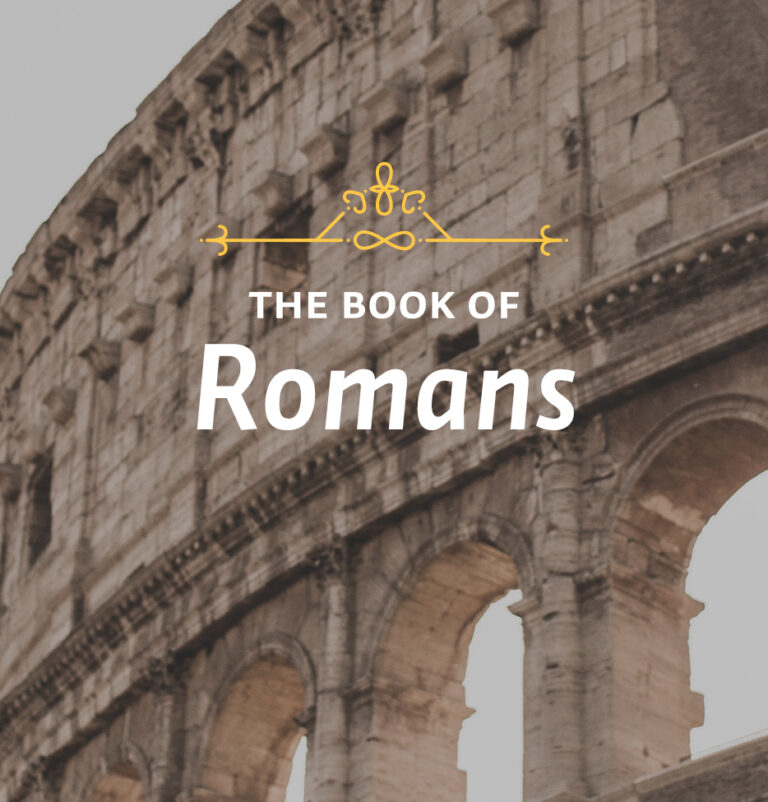
How Should We Then Live?Romans 12:1-2Theme: Obedience.In this week’s lessons Dr. Boice teaches us how to live godly lives in an ungodly world. Lesson

How Should We Then Live?Romans 12:1-2Theme: Obedience.In this week’s lessons Dr. Boice teaches us how to live godly lives in an ungodly world. Lesson

How Should We Then Live?Romans 12:1-2Theme: Obedience.In this week’s lessons Dr. Boice teaches us how to live godly lives in an ungodly world. Lesson

How Should We Then Live?Romans 12:1-2Theme: Obedience.In this week’s lessons Dr. Boice teaches us how to live godly lives in an ungodly world. Lesson

How Should We Then Live?Romans 12:1-2Theme: Obedience.In this week’s lessons Dr. Boice teaches us how to live godly lives in an ungodly world. Lesson

Theme: Profession without Practice
This week’s lessons stress the necessity of obedience if one is truly a disciple of the Lord Jesus Christ.
Scripture: Luke 6:46-49
Jesus spoke about obedience toward the end of Luke’s version of the Sermon on the Mount. He had been followed by people who made verbal profession of discipleship.

Theme: How Does Jesus Speak?
This week’s lessons stress the necessity of obedience if one is truly a disciple of the Lord Jesus Christ.
Scripture: Luke 6:46-49
Several years ago, when I was in northern California, I turned on the radio and heard part of an unusual religious program. It was called “Have You Had a Spiritual Experience?” and was conducted like a call-in talk show.

Theme: Living in the Book: Daily and Systematic Bible Study
This week’s lessons stress the necessity of obedience if one is truly a disciple of the Lord Jesus Christ.
Scripture: Luke 6:46-49
Everything I have been saying so far leads to a practical conclusion, and it is this.

Theme: Living in the Book: Comprehensive and Devotional Bible Study
This week’s lessons stress the necessity of obedience if one is truly a disciple of the Lord Jesus Christ.
Scripture: Luke 6:46-49
Yesterday we mentioned what systematic Bible study is. We now need to see how one does it. Certain procedures should be followed during study. First, the book itself should be read through carefully as many as four or five times, perhaps one of these times aloud.

Theme: The Liberty of Obedience
This week’s lessons stress the necessity of obedience if one is truly a disciple of the Lord Jesus Christ.
Scripture: Luke 6:46-49
Over the last two days we looked at four Bible study methods. Today we begin by mentioning one more.
5. Study the Bible prayerfully (Dan. 9:1-3).
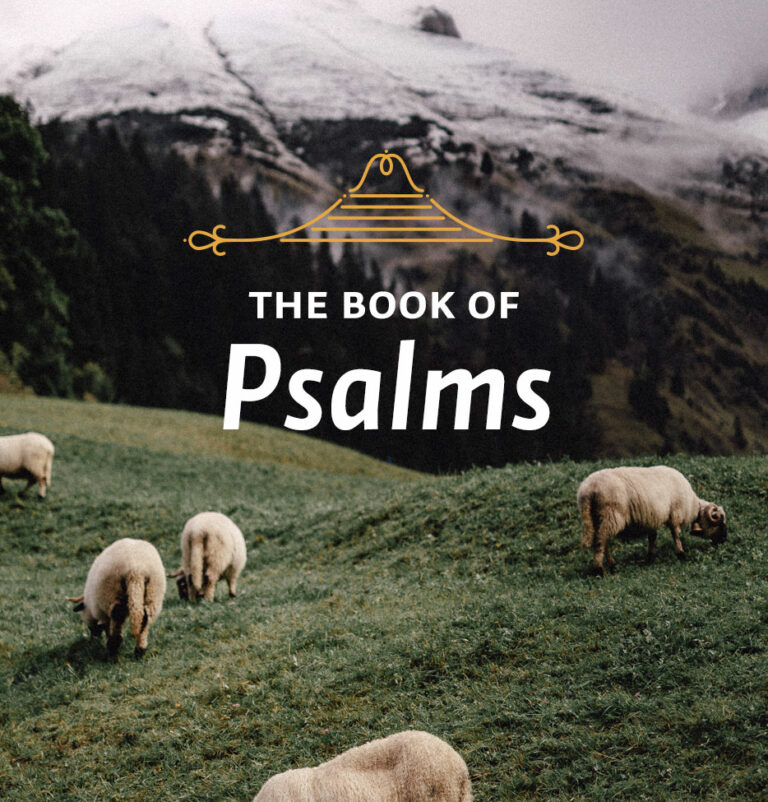
Theme: We Shall See God
This week’s lessons teach us of God’s gracious intention to call a people for himself from every nation, and of our great privilege and responsibility to make the gospel of Christ known to them.
Scripture: Psalm 67:1-7

Theme: The Necessity of Profession and Practice
In this week’s lessons, we see that obedience, Bible study, and prayer lead to true freedom.
Scripture: Psalm 119:153-168

Theme: God’s Mercy and Truth
In this week’s lessons, we see that obedience, Bible study, and prayer lead to true freedom.
Scripture: Psalm 119:153-168
Apparently, the problem of profession without practice was present in the early Christian community, as proved by the epistle of James:

Theme: Peace and Security
In this week’s lessons, we see that obedience, Bible study, and prayer lead to true freedom.
Scripture: Psalm 119:153-168
The psalmist learned various things about God as he studied his Word. In yesterday’s study we looked at two things the psalmist learned, including that (1) God is merciful, and that (2) God’s Word is true. In today’s study we continue with two more points.

Theme: How to Study the Bible
In this week’s lessons, we see that obedience, Bible study, and prayer lead to true freedom.
Scripture: Psalm 119:153-168

Theme: Obedience Leading to Freedom
In this week’s lessons, we see that obedience, Bible study, and prayer lead to true freedom.
Scripture: Psalm 119:153-168
In yesterday’s study, we talked about the need to study the Bible daily, systematically, and comprehensively. Today we will look at two other necessary elements if you want to know God as he speaks to you through the Bible.

Theme: Lifting Our Eyes to the Lord
In this week’s lessons, we learn what it means to lift our eyes to the Lord, remembering his mercy, and striving to please him in all things.
Scripture: Psalm 123:1-4

Theme: Being Faithful Disciples
In this week’s lessons, we learn what it means to lift our eyes to the Lord, remembering his mercy, and striving to please him in all things.
Scripture: Psalm 123:1-4
Spurgeon writes, “We must use our eyes with resolution, for they will not go upward to the Lord of themselves, but they incline to look downward, or inward, or anywhere but to the Lord.”1
He continues:

Theme: When Opposition Comes
In this week’s lessons, we learn what it means to lift our eyes to the Lord, remembering his mercy, and striving to please him in all things.
Scripture: Psalm 123:1-4

Theme: Our Need for God’s Mercy
In this week’s lessons, we learn what it means to lift our eyes to the Lord, remembering his mercy, and striving to please him in all things.
Scripture: Psalm 123:1-4

Theme: Pressing on in Obedience
In this week’s lessons, we learn what it means to lift our eyes to the Lord, remembering his mercy, and striving to please him in all things.
Scripture: Psalm 123:1-4
Let me suggest here that the only thing that will ever lift you out of your sin and complacency, put you on the pilgrim trail, and keep you there throughout life is a profound awareness of the mercy and grace of God.

Theme: A Wonderful Word
In this week’s lessons, we see how we ought to think and act biblically, and the blessings that the Lord provides when we do this.
Scripture: Psalm 128:1-6
“Blessing” is a wonderful word. In spiritual matters, it has to do with God’s particular favors to his people. Because God is generous and great, his blessings are generous and great as well. Once we have begun to experience them they seem to be without limit. God’s blessings go on and on.

Theme: Godly Fear
In this week’s lessons, we see how we ought to think and act biblically, and the blessings that the Lord provides when we do this.
Scripture: Psalm 128:1-6

Theme: Acting Biblically
In this week’s lessons, we see how we ought to think and act biblically, and the blessings that the Lord provides when we do this.
Scripture: Psalm 128:1-6
Yesterday we looked at the first important responsibility for the person who would experience God’s blessings, namely, to fear the Lord.

Theme: Two Blessings
In this week’s lessons, we see how we ought to think and act biblically, and the blessings that the Lord provides when we do this.
Scripture: Psalm 128:1-6

Theme: Working for the City’s Good
In this week’s lessons, we see how we ought to think and act biblically, and the blessings that the Lord provides when we do this.
Scripture: Psalm 128:1-6

Theme: The Climax of the Pilgrimage
In this week’s lessons, we see what God will do for those who, as pilgrims in this life, look to him in faith and obedience.
Scripture: Psalm 132:1-18

Theme: Desiring God’s Honor
In this week’s lessons, we see what God will do for those who, as pilgrims in this life, look to him in faith and obedience.
Scripture: Psalm 132:1-18

Theme: Our Acceptance before God
In this week’s lessons, we see what God will do for those who, as pilgrims in this life, look to him in faith and obedience.
Scripture: Psalm 132:1-18
The next section of this psalm (vv. 6-9) recounts how the Ark was found in the fields of Jaar” in David’s time and how it was brought to Jerusalem. It is an accurate piece of historical remembrance.

Theme: What God Promises to Do
In this week’s lessons, we see what God will do for those who, as pilgrims in this life, look to him in faith and obedience.
Scripture: Psalm 132:1-18

Theme: Looking to Jesus
In this week’s lessons, we see what God will do for those who, as pilgrims in this life, look to him in faith and obedience.
Scripture: Psalm 132:1-18

We come to the very last words of the Sermon on the Mount, the section in which Jesus Christ pictures the difference between those who hear His teachings and do them and those who hear His teachings and do not do them as the difference between a wise man who builds his house upon a rock, and a foolish man who builds his house upon sand. It is a picture that all people know. And it is one that most of us have sung about, in one hymn or another, since the time we were children.

In these closing words of His sermon Jesus was stressing the importance of an adequate foundation, and He is asking the question, “What is your foundation? On what do you build?”

The second important point to be seen in these verses is this: A life built upon Jesus Christ will stand. That is a simple point, of course, but we need to have it clear in our thinking and to get it planted deeply in our minds. A life built upon Jesus will stand, even in the midst of the tribulations of this life or the judgments of eternity.

Now there is one last point here, and it is a point for Christians. What are you building? Oh, you are on the foundation all right. Christ is your Savior. But do you know that it may be possible for Him to be your foundation and yet for you to go through life building things that are worthless and that will not remain as fruit for eternity, even though you will be saved personally?

What are you building upon the foundation that is given you by God? Are you living to yourself? It is entirely possible for Christians to do that. Or are you living for Him? Are you using the talents, blessings, opportunities, influence, and wealth that He has given you to build Christian character and bring men to the Lord Jesus Christ as their Savior?
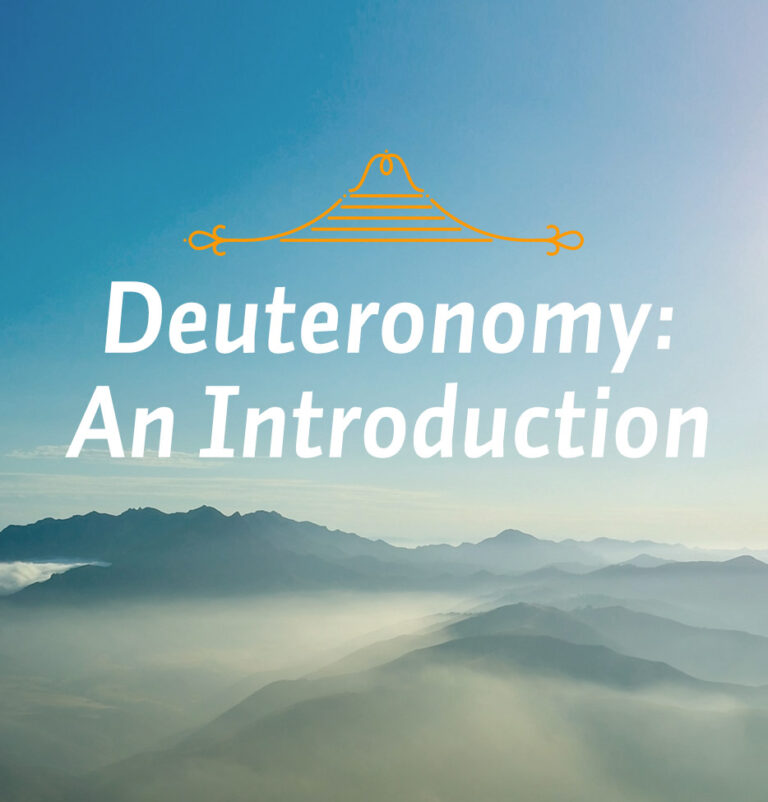
Now let me give you an outline for Deuteronomy. You have a preamble in the first five verses of chapter 1. Then you have three addresses by Moses. Now scholars break them up in different ways, but generally we can divide them up like this: Moses’ first address (Deut. 1:6-4:43) gives a review of the people’s past journey from Mount Sinai to the borders of Canaan; Moses’ second address (Deut. 4:44-26:19) summarizes, restates, and applies God’s law and urges it on the people; and Moses’ third address (Deut. 27-30) is an enactment of the covenant between God and the people, according to which they are going to be blessed for their obedience and cursed for their disobedience. Following this is a short historical section, and then what I have called the second song of Moses (Deut. 31-32). And in the final chapters, Moses blesses the tribes, and his death is recorded (Deut. 33-34).

The second address is a much longer one, amounting to twenty-two chapters and making up the substance of Deuteronomy. The first part (Deut. 5-11) reiterates the law of God as it bears on the people’s relationship to God. The second part (Deut. 12-26) reiterates the law of God as it bears on the people’s relationship to the land and to other people. This division concerning God on the one hand, and people on the other, should ring a bell because that’s exactly what you have in the Ten Commandments. The first table of the Ten Commandments has to do with our relationship to God. We are to remember Him, worship Him only, have no other gods before Him, and remember to keep the Sabbath day holy. And then the second table begins with the family and the need to honor your father and mother, and then concludes with the commandment not to covet. Those two parts of the Ten Commandments are reflected in a dynamic way in Moses’ second address.

The second thing the people are encouraged to do is to impress these laws—above all, the duty to love God wholly—upon their children. After Moses tells the Israelites to love the Lord their God with all their heart, soul, and strength, he then says, “These commandments that I give you today are to be upon your hearts. Impress them on your children. Talk about them when you sit at home and when you walk along the road, when you lie down, and when you get up. Tie them as symbols on your hands and bind them on your foreheads. Write them on the doorframes of your houses and on your gates” (Deut. 6:6-9).

If you have an opportunity to teach, whether it is in your home or in church, and whether to children or adults, don’t be afraid to repeat, repeat, repeat the teachings of the Word of God. People need to hear the law, they need to hear the Gospel, and they need to hear both of them again and again and again. It is significant that in the middle of this repeated law, we find the greatest of all the commandments: love the Lord your God with all of your heart, mind, soul, and strength. As we learn to love Him, by the grace of the Lord we also learn to obey.

Some scholars regard the book of Deuteronomy as the heart of the Old Testament, and some call chapters 27-30 the heart of Deuteronomy. In these chapters, Moses forcefully urges on the people the kind of life that is based on what God has done. In chapters 4-26, he has given the chief substance of the teaching. As a preacher, Moses is pressing this point home upon the people. He is about to die and will soon leave the people he has led for decades. He urges the people to choose righteousness and obey God, because that’s the way of blessing. The other way is the way of death.

The second point of our outline has to do with the blessings and curses. When the people came into the land and had written the law on the stones and the altar had been set up, the Israelites were supposed to stand on these two mountains, in the area of the country known as Samaria now, about 3,000 feet above sea level. At one point, the two mountains come close together. Half of the tribes were to take their places on Mount Gerizim and the other half on Mount Ebal. The Levites were to recite the blessings and the curses. And after each curse and each blessing, the people would answer by saying, “Amen.”

The third point is to urge the people to obey. Moses was a great preacher, and he rises to heights of eloquence here in Deuteronomy 29-30. Even after he spelled things out as sharply as he does in Deuteronomy 27-28, he goes on to urge his applications on the people even more. Moses reminds the people of the past, describes what entering into the covenant really means, gives an additional specific warning of disasters to come, and finally promises prosperity in the future, if, after having fallen away, the people repent of their sins and come back to the Lord they have deserted.

Moses already went over the people’s history before. Why is he saying it again? Moses explains that even though he said it before, the people didn’t really see it. It didn’t get through to them. The people were blind to the implications of the work of God. We need spiritual sight, too, and such spiritual healing only comes to us from God.

If you know you are a sinner, go to Christ, confess your sin, and find salvation in Him. Then, by His grace and the power of the Holy Spirit, get on with living the Christian life. Paul says, “If you confess with your mouth that Jesus is Lord and believe in your heart that God raised him from the dead, you will be saved. For it is with your heart that you believe and are justified, and it is with your mouth that you confess and are saved” (Rom. 10:9). Is salvation that simple? It is. But it is of vast importance. And whether we believe and act on our belief is a matter of spiritual life or spiritual death.
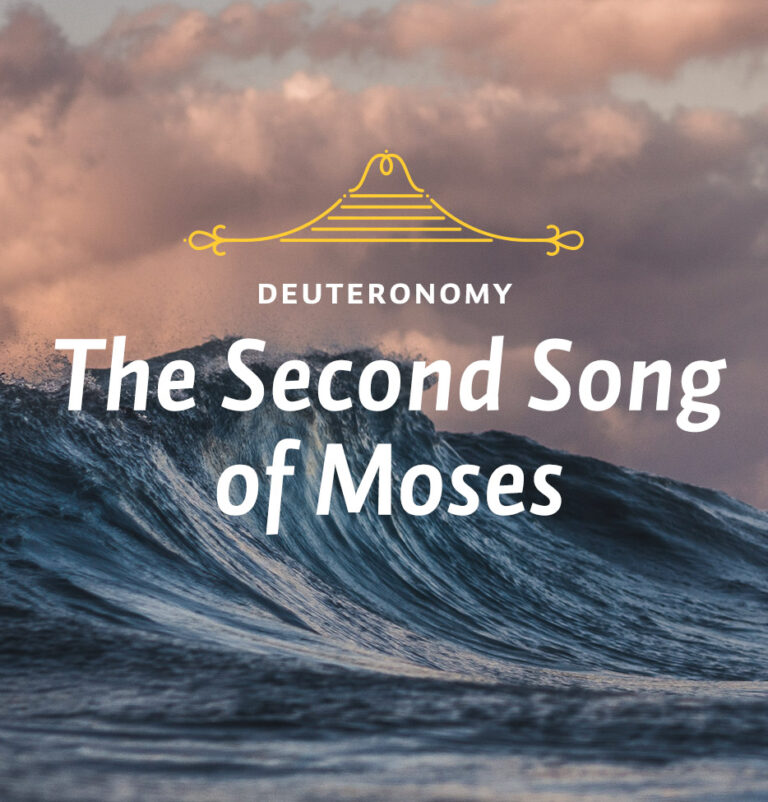
Don’t get into the habit of thinking you can retire in the Christian life. You may retire from your job, but as long as you are living, there is work to be done and there is a testimony to bear. This is true of Moses, and he does his work to the very end.

We are fighting spiritual battles and we are doing it in a hostile environment. There are citadels of unbelief to be overcome. We need courage to do it, and we get that courage from reading the Bible, from praying, and from being encouraged by one another. We need to encourage one another. Moses is encouraging Joshua, God is encouraging Joshua, Joshua is encouraging the people, and the people are encouraging Joshua. Sometimes, life is relatively easy, but then difficulties come into our lives. We need Christian friends to say to us, “Come on, don’t be afraid now. God will be with you and He will bless you.” That’s a great ministry for any Christian to have. Ask the Lord whom you can encourage to press on.

I’ve called it a “second song” of Moses because there is an obvious parallel between this song that comes here at the very end of his life, just before the people are to enter the promised land, and the song they sang after they were delivered from Egypt forty years earlier. The song at the beginning of their desert wandering was filled with joy, while the song at the end is filled with warnings. Yet at both the beginning and the end, the people are singing.

n verse 8 of the fourth section, a universal note is struck when it pictures God as the Most High God who gives to every nation the territory that it is supposed to have. With a very nice turn of phrase Moses says in verse 9, “For the LORD’s portion is his people, Jacob his allotted inheritance.” Paul refers to verse 8 when he preaches his sermon before the Greek intellectuals on Mars Hill, telling them that God has given all the nations their own portion of land as their inheritance (see Acts 17:26).

The final section (vv. 39-43) of this song deals with the nature of God and final victory. At the very end, the word atonement suddenly appears. He will “make atonement for his land and people” (v. 43). They would probably think of the Day of Atonement, which is pointing forward to the coming of Jesus Christ. You see, it’s only because of the coming of Jesus Christ that you and I are ever going to escape the judgment which hangs over us. Christ shields us from all wrath; outside of Christ, we are exposed to all wrath. Moses’ great song teaches that judgment is coming, but God provides deliverance from it by making atonement. The people need to find refuge in Him.
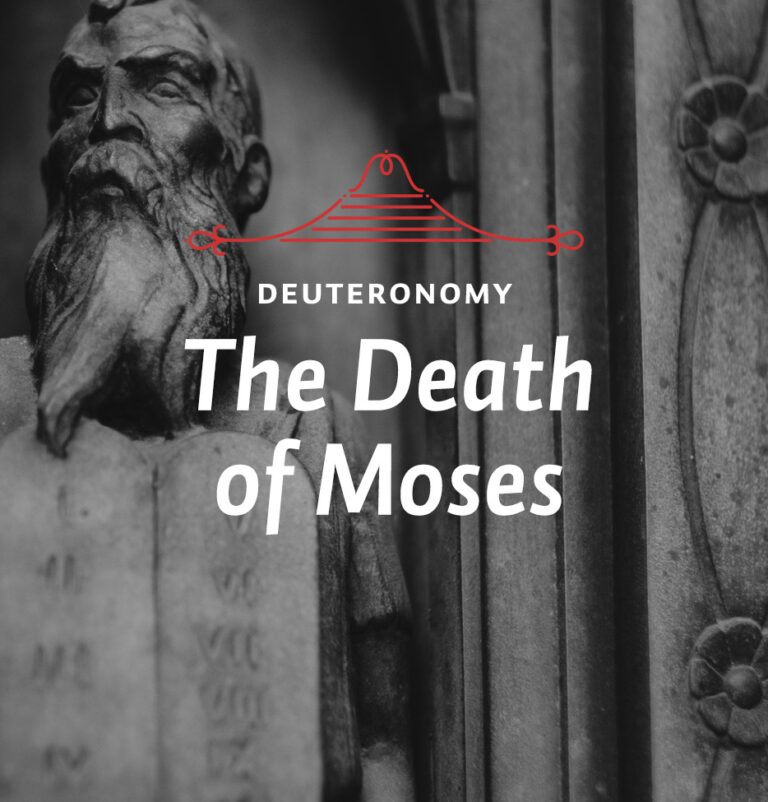
Moses, the servant of God, had many dying words. In a sense, they are the entire book of Deuteronomy. It consists of three addresses, and we looked at two of them. The first was urging godliness upon the people, and the second dealt with a challenge to the people. Now, in Deuteronomy 33, Moses gives his third address, which is a blessing upon the tribes. As this book concludes, we see that Moses’ last words are in praise of God, and the last thing God has to say in this book, in the last three verses, is praise of Moses.

With the start of chapter 12, we come in our studies of Paul’s letter to the Romans to the practical section of the book. Ours is a practical age and most people want “practical” teaching. But to call these chapters practical suggests that the doctrinal sections are not practical, and whenever we find ourselves thinking along those lines we are making a mistake and contributing to great misunderstanding.

If revelation is the basis for social morality and ethics, then it is impossible to have valid, effective or lasting morals without it. We must have Romans 1-11 in order to have Romans 12-16.

In Monday’s study I commented on Francis Schaeffer’s book How Should We Then Live?, saying that “then” is the all-important word. Now I note that when we come to the first verse of Romans 12 we discover exactly the same thing, only in this case the important word is “therefore.”

“Therefore” is a linking word, as I have said. We have looked back to what it refers to. Now we should look forward to see what the doctrinal material of chapters 1-11 connects with. I am handling it in seven sections.

True conversion makes a difference in a person’s life. If there are no differences, there is no genuine conversion. But what are the differences? They are precisely those that are spelled out in the remaining chapters of this letter. Laws in themselves change nothing, or at least very little. It is changed people who change everything. And the only thing that ever really changes people is God Himself through the Gospel of our Lord Jesus Christ. If you have been called to faith in Jesus Christ, you are part of a radically changed community, the new humanity. It is your privilege to begin to make changes in our world.
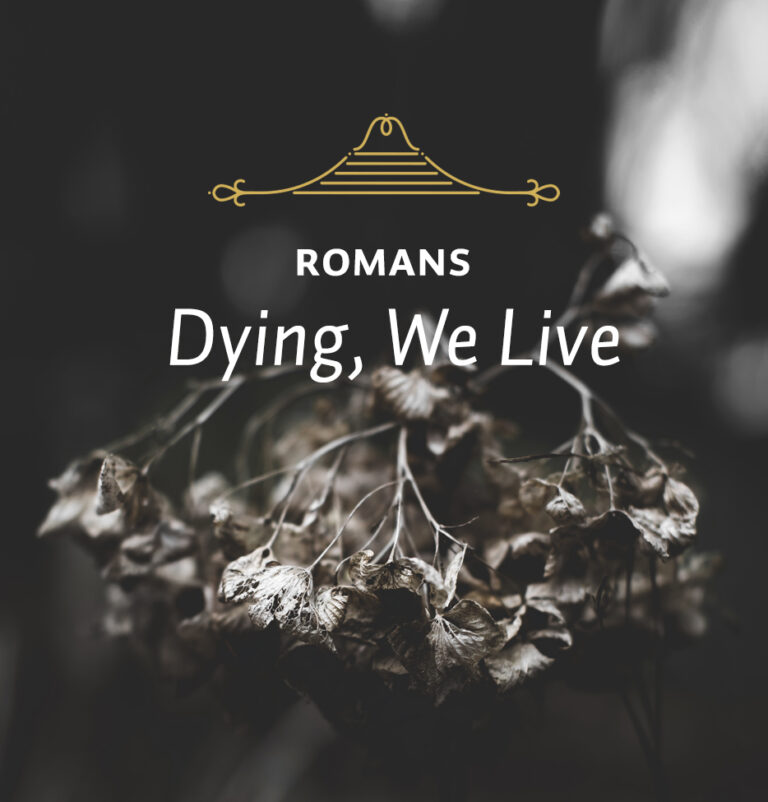
I do not like the word “paradox” used in reference to Christian teachings, because to most people the word refers to something that is self-contradictory or false. Christianity is not false. But the dictionary also defines “paradox” as any statement that seems to be contradictory, yet may be true in fact, and in that sense there are paradoxes in Christianity.

The principle of sacrifice is so foundational to the doctrine of the Christian life that we must be very careful to lay it out correctly, and in order to do that we need to review the foundations for this foundation.

Redemption from sin by Christ is not the only doctrine the Christian life of self-sacrifice is built on. A second foundation is our having died to the past by having become new creatures in Christ, if we are truly converted.

So I ask, who are you willing to believe? Yourself, reinforced by the world and its way of thinking? Or Jesus Christ? I say “Jesus” specifically, because I want to remind you of His teaching from the beginning of the Sermon on the Mount. He speaks there about how to be happy. Indeed, the word is even stronger than that. It is the powerful word “blessed,” meaning to be favored by God.

Paul’s words in Romans 12:1-2 are an urgent appeal to us to do something, to offer ourselves as living sacrifices to God. This is not done for us. It is something we must do. This leads to the fourth and final foundational truth. It is the “obedience that comes from faith,” which Paul wrote about early in the letter, saying, “Through him and for his name’s sake, we received grace and apostleship to call people from among all the Gentiles to the obedience that comes from faith” (Rom. 1:5).

I find it significant that this is where Paul’s statements about being transformed by the renewing of our minds, rather than being conformed to the patterns of this world, end. They end with proving the way of God to be the best way and the will of God to be perfect.

In this verse “will” is to be interpreted in its context, and the context indicates that the will of God that we are encouraged to follow is the general will of offering our bodies to God as living sacrifices, refusing to be conformed to the world’s ways, and instead being transformed from within by the renewing of our minds. It is this that we are to pursue and thus find to be good, pleasing and perfect, though, of course, if we do it, we will also find ourselves working out the details of God’s specific will for our lives.

The will of God that we are talking about is good, pleasing and perfect. In other words, it teaches about the nature of God’s will for us as well as the fact that God has one.

We need to prove by our experience that the will of God is indeed what Paul tells us it is, that is, that it is good, pleasing, and perfect. We need to check it out. Moreover, it is by checking it out that we will begin to find out what it actually is.

The Lord Jesus Christ took it upon Himself to prove that God’s will was indeed good, pleasing and perfect, even though it involved the pain of the cross, which in itself hardly seemed good, pleasing or acceptable.

Right or wrong? Making that distinction rightly is what civilization—not to mention right religious behavior—is all about. But that is what we have lost in America. We do not believe in right and wrong. Therefore, it is against that serious national problem that we come to Paul’s challenge to Christians in Romans 12:17, where we read, “Be careful to do what is right in the eyes of everybody.”

In order to pursue a goal, there must be a goal. To have a strong moral society, we must have moral absolutes. Otherwise, all we can have is what is pragmatic or expedient, which is what education, politics and American life as a whole has come to. It is why we do not have any heroes today and why we do not have any moral leadership in the country.

We need to have our national morality renewed. But, of course, that is only another way of talking about the problem. Corporate morality is the one thing we cannot have if the only thing we can say about values is that they are relative.

We live in a trashy culture, worse—a sinful, evil, ugly and perverted culture. It is hard not to be sullied by it. Yet it was no different in Paul’s day. The Greek and Roman world of the first century was a slime pit. But in spite of it, Paul says that Christians are to set their minds on good things, things that are true, noble, right, pure, lovely, admirable, excellent and praiseworthy. We are to seek the best rather than the worst of the world around us.

In spite of everything I have said this week about America’s moral decline and the loss of a fixed moral standard for most people, the real problem is having the will to do what is right even when we know what it is.

The human conscience is a very strange thing. Considering how evil men and women are, it is surprising that we have a conscience at all. Yet we do. At times it plagues us.

There is only one way in which conscience can be a sure guide to right conduct, and that is when the light of God’s Word is shining on it. When the light of God shines on the sundial of your conscience you get the right time. But apart from that the conscience is like a trained circus dog. You whistle once, and it will stand up. You whistle twice, and it will roll over. The third time it will play dead.

When God is telling one of His children something the person does not want to hear, he or she often wishes that God would stop talking. But what if God actually does stop talking? Ah, that is much, much worse. Without physical bread a man or woman may die, but live forever. We can live eternally without bread. But what if we are deprived of God’s Word? We cannot live without that.

The pinch of want is never pleasant, but it is a gift when it brings us to our senses. David said, “Before I was afflicted I went astray, but now I obey your Word” (Ps. 119:67). May God awaken our consciences to that same obedience.
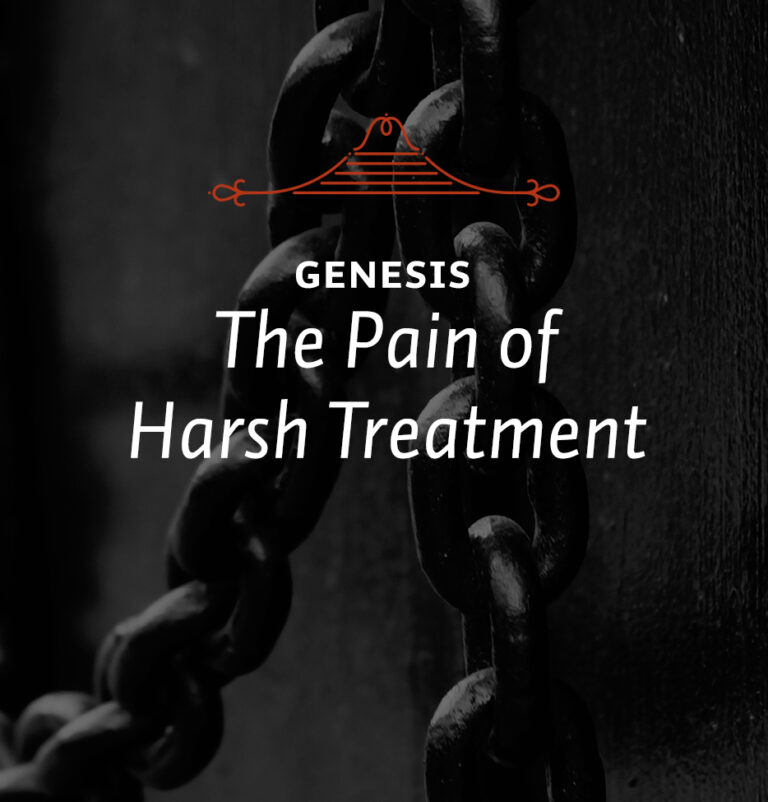
The second of these devices, after the pinch of physical want, was the pain of harsh treatment at the hands of Joseph. Before long this was to become harsh treatment of a physical sort; all of them were cast into prison, and one of them, Simeon, was kept in prison. But at the beginning this harsh treatment was merely in the form of words. The story tells us that when the brothers came down to Egypt to buy grain Joseph “recognized them, . . . pretended to be a stranger and spoke harshly to them” (Gen. 42:6-7).

It is not only insults that hurt us either. Even truth hurts, sometimes even when it is spoken kindly.

Joseph is God’s man in all parts of this story. He had been honored more than once as a prophet of God. God had spoken to him, guided him, protected him, and kept him from sin. Surely he was not left to his own devices now, but was rather acting as God’s agent in awakening the consciences of these brothers. His words were God’s voice to them.

If Joseph were re-enacting the scene at the pit, perhaps even repeating to the brothers the words they had hurled at him, which had been indelibly etched in his memory, then it is understandable that the brothers began to come around at this point. Joseph’s words were not an unbridled outpouring of invective or mere cruelty. They were carefully calculated words which proved effective in bringing the brothers to a necessary confession of their sin and so to salvation.

We must never resent or resist the harsh treatment God sometimes gives out as we study His Word or hear it proclaimed from the pulpit. God hates sin. Therefore the Word of God, which reflects His holy character, customarily exposes our sin and calls for our repentance. Comfort? Yes, the Bible contains great comfort, and promises too. But the comfort and promises are only for those who confess their sin, obey God and pursue righteousness.
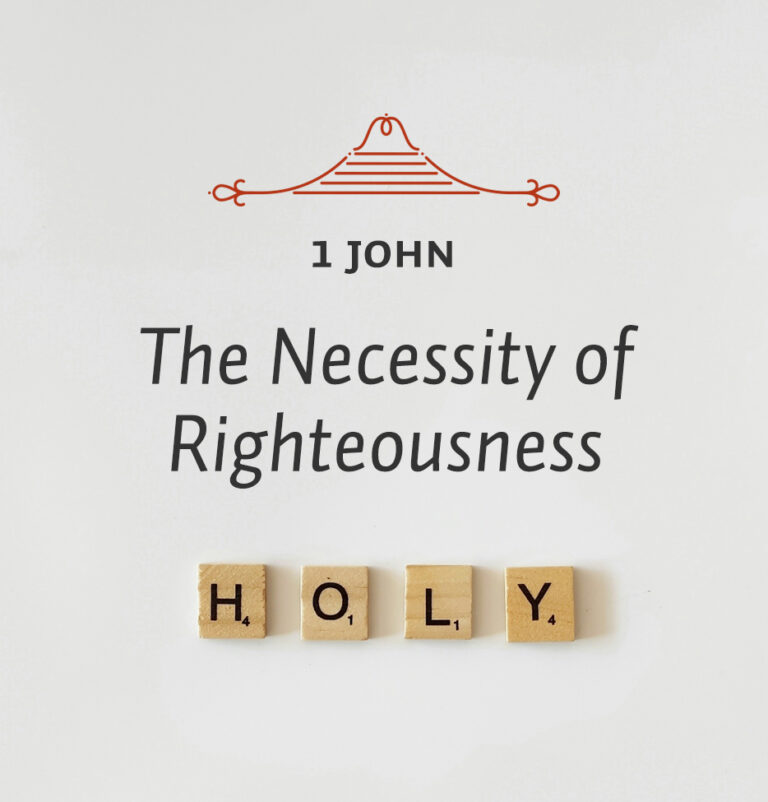
Anyone who has worked with young Christians knows that often shortly after a person has believed in Christ doubts set in. The initial experience of the Christian is usually one of great joy. He had been lost in the darkness of his own sin and ignorance; now he has come into the light. Formerly he had not found God; now he has found Him. But then, as time goes by, it is also frequently the case that the new Christian begins to wonder if, in fact, anything has really changed. He thought he was a new creature in Christ, but, to speak frankly, he is really much as he was. The same temptations are present; they may even be worse. There are the same flaws of character. Even the joy, which he once knew, seems to be evaporating. At such a time the new Christian often asks how it is possible to be certain that he is saved by God. He may ask, “How can I truly know that I know God?”

In contrast to either of these two Greek ideas, John’s understanding of the knowledge of God is essentially personal and practical. So it is satisfying. It is satisfying because it is knowledge, not of an idea or thing, but of a person, and because it issues in a profound change of conduct.

Why is the righteous life a proof that we know God? Because it is not natural to sinful man. Consequently, it is proof of a divine and supernatural working in our lives if we obey Him. Paul makes the same point when he follows his admonition to the Philippians to “work out” their salvation with the profound observation, “For it is God who worketh in you both to will and to do of his good pleasure” (Phil. 2:13).

Yesterday, we pointed out that there are two kinds of men, and considered the first category. This is the man who claims to know God but who does not keep His commandments. Today we continue with a description of the second category of men.

This conclusion also comes to Christians living in our own time. Do we say we are Christians? Then “he that saith he abideth in him ought himself also so to walk, even as he walked.” Clearly, in this verse the first “he” is the Christian; the second “he” or “him” is Jesus. The call is to emulate Jesus in our conduct.

In these references John writes to the newborn in Christ to assure them that he is writing, not because they are not saved (which some of his remarks might lead them to question), but because they are and because he wants them to progress in their Christianity.

John’s two statements to the spiritually mature of his congregations, the fathers, are identical; what is more, they are also quite similar to the second of his statements to children. There is one difference, however, and in this difference lies the distinct nature of John’s reference.

The first part of John’s long parenthesis, verses 12-17, was written to reassure his readers; for John did not want them to think that he was questioning their salvation. Rather, he has written to them because their sins have been forgiven and because they do know the Father. If they miss this truth, they have misunderstood him. On the other hand, John does not want them to think that what he has written regarding the tests of life has no relevance for Christians, for this would be a misunderstanding too. Thus he now goes on to show how what he has said should be applied to their lives.

In the first sense, Christians are to receive and be thankful for the world, for it is God’s gift. Jesus Himself was appreciative of the world in this sense. In the second sense, Christians are to love the world and seek to evangelize it, for God also loves the world. In the third sense, however, the sense we have here, Christians are to reject the world and conduct their lives according to an entirely different set of values.

But does nothing at all abide? Yes, says John. The one who does God’s will abides forever. The object of his love, even the Father, abides forever. His love itself, having its source in God, abides forever. His works, being an aspect of the work of God, abide forever, for he is the possessor of eternal life and heir to all God’s riches in Christ Jesus. The conclusion is that Christians should therefore love God and serve Him fervently.

At the end of the preceding chapter John has spoken quite sharply about the need to love, saying, “If a man says, I love God, and hateth his brother, he is a liar; for he that loveth not his brother, whom he hath seen, how can he love God, whom he hath not seen?” But it is entirely possible that a person might try to escape this demand by asking, “And who is my brother? Just whom precisely am I to love?”

In John’s understanding, the potential child of God is first made alive by God, as a result of which he comes to believe on Christ, pursue righteousness, and love the brethren.

When a birth takes place the individual involved is not born into isolation, nor is he a totally unique individual in the sense that his characteristics and attributes have no connection with those who have gone before. For one thing, he is born into a family and into family relations. For another, he possesses at least some of the characteristics of the one who has engendered him. Spiritually, this means that the child of God exhibits those characteristics about which the letter has been teaching.

The second thing that John is probably thinking of is suggested by this passage. Here he is writing of the new life which Christians have from God and of the resulting love which they bear to Him. Without this life and love the commands of God, even in the form in which Christ gave them, could be burdensome. But now, the life of God within makes obedience to the commands possible, and the love which the Christian has for God and for other Christians makes this obedience desirable.

The third of John’s tests is expressed in these verses as belief. Indeed, it is with this concept that the section both begins and ends (vv. 1, 5); between belief that “Jesus is the Christ” and belief that “Jesus is the Son of God” is found John’s discussion of both love and obedience. The implication is that, just as it is impossible to have love without obedience or obedience without love, so also is it impossible to have either love or obedience without belief in Jesus as the Christ and the Son of God.
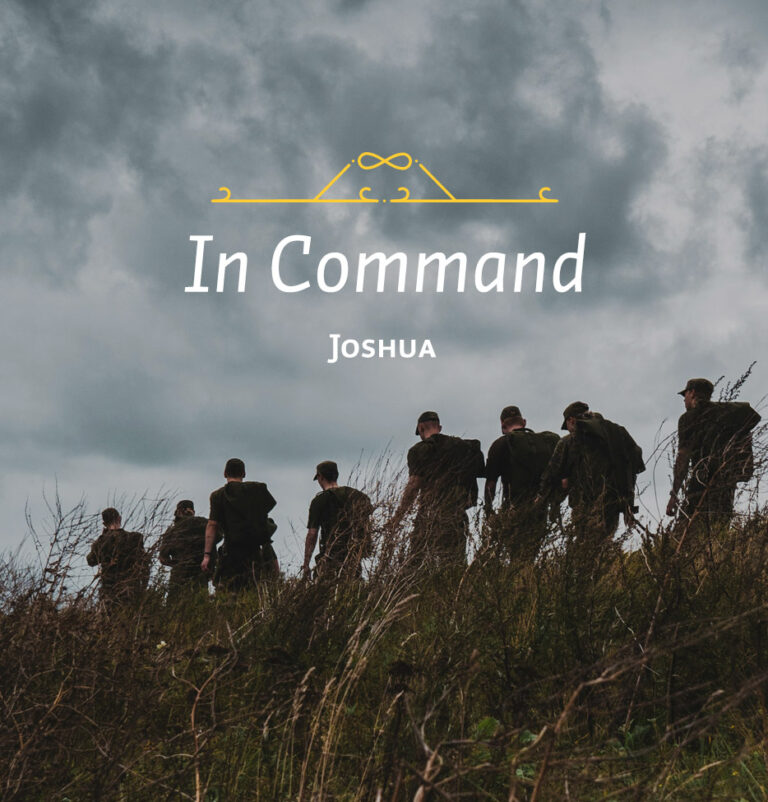
There are two main sections to the first chapter of Joshua. The first part, in verses 1 through 9, contains an account of Joshua’s commissioning by God. The second part, verses 10-18, tells us how Joshua assumed command of the people and began to make preparations for the invasion of the Promised Land.

The third thing that is impressive about the early life in the faithful past of Joshua concerns the earlier incident where Moses sent the spies into the Promised Land.

Secondly, Joshua received a specific call, which we find in Joshua 1. Now when we talk about a call, we have to say that there is a sense in which all of us at all times as Christians have a general call. None of us is left to do nothing. We are all called to be disciples of Jesus Christ.
We’re all called to do good works. That’s just part of what it means to be a Christian. But that’s not what I’m talking about here when I’m talking about a call to leadership. I’m talking about a call to something specific—that is, to a task that a particular individual is given to do.

There’s a third thing I want to mention, and that is that a person who would be a leader must know, and have, and study, and meditate upon God’s objective revelation. It’s important to say that because that subjective and specific call must always be evaluated by, and at times, corrected by, the objective Word of God.

The final thing I want to say is that Christian leaders must also demonstrate genuine faith in God. Joshua was preeminently a man of faith. God told Joshua, “This is the land and I’m going to give it to you.” Joshua believed God, so when he went into the land with the other spies and searched it out, he didn’t care if there were giants. It didn’t bother him that there were walled cities.

Now, we’re looking at those chapters of Joshua that deal with the crossing of the Jordan River. Like all good stories, Joshua is written in episodes. There have been two already. Chapter 1 focuses on the commissioning of Joshua in his first commands to the people. Chapter 2 concerns the sending of the spies into the Promised Land and their meeting with Rahab, and it focuses on Rahab’s act of faith in protecting them and identifying with the people of Israel. And then in chapter 3, we have the beginning of this new episode, which is the crossing of the Jordan.

Last week, when we looked at chapter 3 and the crossing itself, we saw that the most important element in that crossing is the emphasis found there upon the Ark of the Covenant. The ark symbolized the presence of God. It has not been mentioned in Joshua until now, but suddenly in these chapters connected with the crossing of the Jordan, it is mentioned many times. The ark symbolized the presence of God, and as the people crossed the river, they did so with the ark going before them. In other words, God went before them.

Now I need to acknowledge that there’s a bit of a technical problem at this point. It’s perfectly evident from any reading of this chapter that the twelve men chosen by the people were to each lift up a stone from the Jordan, carry it up, and then place it upon the bank. These were then arranged into a memorial. This was a mark of their camp at Gilgal to which they often returned. There’s no question about that. This technical difficulty that I refer to comes from the fact that in the original version of verse 9, the text literally says, “Joshua set up twelve stones in the middle of the Jordan at the spot where the priests who carried the ark of the covenant had stood.” This has led many commentators to suppose that there were two memorials.

Now where does that leave us? The point I want to make is the one I have already been alluding to, namely, that we all need memorials like this in our lives. The people of Israel needed their memorials, and they needed other memorials besides this one. In 1 Samuel 7:12 we’re told of the prophet Samuel setting up a memorial which he called, “Ebenezer.” It was the occasion of a great victory in which God had intervened in a supernatural way to defeat the Philistines. It says that in the remainder of Samuel’s lifetime the Philistines didn’t invade the territory of Israel ever again. To mark that great victory, Samuel set up this stone, which he called, “Ebenezer,” which means “the Lord helps.” And he said, “We’re naming it ‘Ebenezer’ because hitherto hath the Lord helped us.”
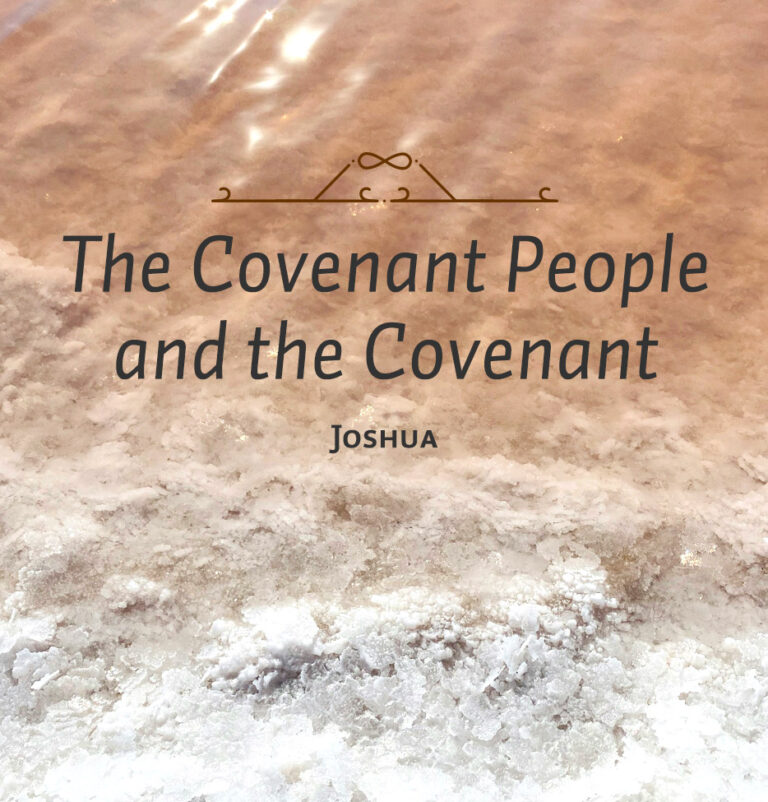
This week we are continuing our study in the third episode of Joshua, which is the crossing of the Jordan River. We learned last week that this third episode has three parts. The first part was the crossing of the Jordan itself, with the Ark of the Covenant going before the people. The second piece was God’s command to set up the memorial stones. Now this week we come to the third of the incidents that are connected with the crossing, and this concerns the consecration of the people once they had passed over into the land and had set up their memorial.

It was bad enough to know that these thousands of Jewish invaders were there in the desert on the far side of the Jordan; but then suddenly, the waters were stopped and the masses passed over. At that point these kings knew it would only be a short time before the city of Jericho and all the other cities of the land would be attacked.

Now it’s worth thinking about these two acts of consecration. Circumcision was the sacrament that had been given to Abraham so many years before. It was the mark of being a member of the covenant people, and it was accompanied by the promises of God. In this particular covenant, it was a case of God establishing the terms by which He would be the God of the Jews and the Jews would be His people.

You see the difference: circumcision is identifying with God in the covenant and receiving by faith the promises of what God will do. The Passover is a looking back and a remembering of what God had done. What God had done in the case of the Passover, of course, was to deliver the people out of Egypt.

So in the sacrament of circumcision we find its parallel in the matter of our baptism. And when we look at the Passover, we find its parallel in our Communion service which looks back to the death of Christ. The Lord’s Supper has the elements of the broken bread and the wine, which signify Christ’s broken body and poured out blood. We see that we are to consecrate ourselves as well, because the God who operated with His people in the past is operating with us today.

You notice that Joshua did not do what we would normally expect of a military commander. Joshua did not assemble his war council to determine the best way to attack Jericho. They did not try to take the city using the standard methods of the day. They did not try to construct siege ramps, nor did they try to cut off Jericho’s food supply and starve the city into surrender. Instead, the Lord specifically told Joshua how to go about the conquest of the city, as peculiar as the plan was from the standpoint of military strategy. And Joshua obeyed the Lord’s instructions.

That’s a most unusual set of instructions for taking a city. One might even say that it was utterly unreasonable to think that the walls of Jericho would fall in such a manner. But Joshua obeyed the Lord, and the people obeyed Joshua. The city was encircled according to God’s precise instructions. And on the seventh day at the end of the seventh encirclement, the horns were blown, the people shouted, the walls fell down, and the city was taken as God told Joshua it would be. It was a great victory.

During all this strange silence of the Israelites, I can’t imagine that as they went around this city day after day that the defenders within the walls were silent. Maybe the first day they were. They must have watched by their walls in awed silence at this vast host of invaders silently encircling their city. They must have wondered, “What is this army up to?” What a bizarre situation that must have looked like: a silent city defended by silent soldiers surrounded by a silent army. It must have been the strangest military invasion in history.

There’s a third step in the preparation of the people for their victory, though it overlaps the one I’ve just given. First of all, be silent. Second of all, obey. But thirdly, obey in all things to the very end. I call this “total obedience to the very end.” This third point is important because obedience that is not total and to the end is not true obedience. It’s really disobedience.

We face spiritual challenges that are just as real. We go up against a different form of walled cities, strongholds of that one who is God’s and our enemy, the devil. Sometimes these are in the world. There are great bastions of evil power in this world. Sometimes they’re in the church. Sometimes they are within our own hearts. God is in the business of tearing down those strongholds, and He uses us as His soldiers.

It’s agreed by most Old Testament scholars that the heart of the Old Testament law is the book of Deuteronomy, and that the heart of Deuteronomy is the list of blessings and curses that are found in chapters 27 through 30 of that important book. Deuteronomy presupposes an eternal covenant established by God with His people. But it goes on from that fixed point to discuss the principle of blessing and lack of blessing which is based on either the obedience or disobedience of the people to the revealed law of God, which is where this list of blessings and curses comes in.

Mount Ebal and Mount Gerizim are in the high country about 25 miles north of Ai and a little bit to the west. Now Ai, as we saw when we were studying these initial battles, was at the high end of the approach road that Joshua and the armies used as they moved into the country from the Jordan. Jericho, that great fortified city, stood at the lower, eastern end of the road. And Ai, a smaller fortified city, stood at the higher western end. After they had taken Ai, the Jewish armies possessed the high country. And they were free to proceed either to the north or to the south in establishing an even stronger hold upon the country. That’s what they would have been expected to do.

This is precisely what we have recorded as being fulfilled in Joshua 8. All Israel were standing on both sides of the Ark of the Covenant of the Lord, facing the priests who carried it. Half of the people stood in front of Mount Gerizim and half of them in front of Mount Ebal, as Moses, the servant of the Lord, had formerly commanded when he gave instructions to bless the people of Israel. Afterwards, Joshua read all the words of the law—the blessings and the curses just as it is written in the Book of the Law. There was not a word of all that Moses had commanded that Joshua did not read to the whole assembly of Israel, including the women, children, and the aliens who lived among then. It must have been a most stirring moment.

There is also something else we need to see. This matter of the reading of the law at Mount Ebal and Mount Gerizim was not only given to teach the principle that blessing follows obedience and judgment follows disobedience; it was also given to explain the way of finding God’s favor when we do disobey.

The other reason why this passage is tremendous is because this altar of uncut stores was not constructed, as we might suspect, in the valley between the two mountains. Rather, they were told to build it on Mount Ebal, the mountain of the curses. Why was it built on the mountain of the curses? It was built there because that was the mountain upon which sinners stood. It was a way of saying that if you’re going to come to God by means of the sacrifice, you come not as one who views himself as righteous, but as a sinner.

What would you do if you were a Gibeonite? Well, what they did was resort to a deception. They decided that because they weren’t strong enough to beat the Jewish armies, they were going to have to fool Israel somehow if their lives were to be spared. So they came up with a plan.

To put it in very basic terms, we cannot say, “This is the path that seems good to me” and, therefore, choose it. What we have to do is inquire of the Lord and follow His direction as we find it in Scripture, regardless of whether or not that is the path that seems good to us personally.

Yesterday, we looked at the first two points from Ephesians 6 about our spiritual warfare. The third is that we’re to carry the offensive weapon, our sword, which is the Word of God. It means we have to know it. We have to be able to use it. We have to have it at our disposal.

Perhaps you can apply how the Israelites regarded their treaty by supplying specifics from your own experiences. You get into something that perhaps was wrong for you, but you said you would do it and now you have to stand by it. You said, “Well, I’m in a business venture, but it’s costing me.” Well, that’s alright. If you said there was something you were going to do, you have to do it. You have to stand by it even though it’s costly.

The point I want to conclude with is simply to say that in many ways, we are like the Gibeonites. All the parallels are there. We were ignorant of the true God, and we worshipped false gods. We were under judgment, but we heard about God and we responded. And so, by the grace of God, we were brought into the fellowship of the covenant people. The same thing can be said about the Gibeonites. Were the Gibeonites liars and deceivers? Yes, they were; but so were we. Were they under judgment? Yes, they were. They had no hope in the world apart from God. But we were as well. Paul tells the Ephesians that as Gentiles they were cut off from the covenant of Israel. They were without God and without hope, just as we were.
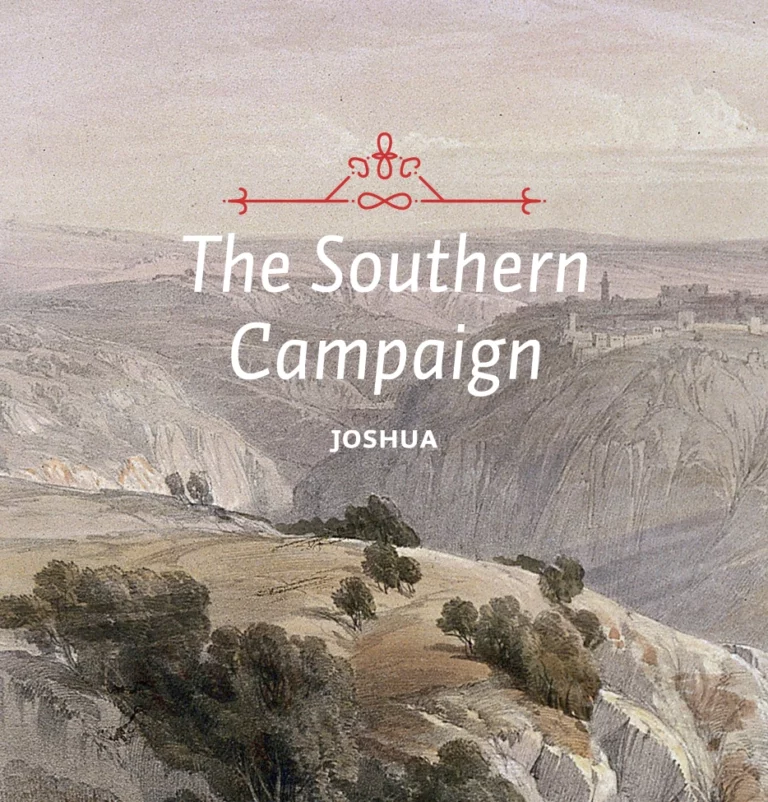
In the middle of Joshua 10 there’s an interesting change in the nature of the narrative that describes the Israelite conquest of Canaan. Up to this point in the story, there have only been three real battles. There was the attack on Jericho and the destruction of that city; the attack on Ai and its destruction; and then there was the battle at Gibeon that began outside the walls of the city and continued southward as the Jewish armies pursued the retreating armies of the southern coalition. And all of that’s been given in considerable detail.

The routed armies were led by five kings. These five kings were apparently together directing the military operations. And when they saw the battle go against them and recognized that they were in great personal danger themselves, they hid in the cave near the town of Makkedah. And they went in to hide, thinking that in the battle the rush of the troops would pass by. Then after they had passed, the kings could emerge and make their way back to the city. They could regroup their fortresses and prepare to fight another day.

I think this is a good point to look back over this campaign and its details and see what it teaches us about the characteristics of strong leadership, which Joshua showed. There probably are other things that can be said about Joshua on the basis of other texts. But just looking at this one campaign, I see at least six things that are worth mentioning and trying to apply to ourselves.

Growing in the Christian life is no mystery. Christians have known what it is in all ages. It’s studying the Word of God. It’s praying. It’s fellowshipping with Christian people. It’s worshipping. It’s working for God. It’s witnessing. It’s testifying. Those are the things through which you grow. And then in response to these things, people say that it takes a long time, and that it’s difficult to read the Bible regularly. There are so many interruptions. That’s right, of course. Nobody ever said it was easy, but that’s the way it’s done.

This leads to the fifth characteristic, which is that Joshua obeyed the Lord completely. This was the most striking of his characteristics. If you go back to the very beginning of the book, you’ll recognize that in the first words of God to him, this is what he was encouraged to do: “Be careful to obey all the law my servant gave you. Do not turn from it to the right or to the left so that you may be successful wherever you go. Be careful to do everything.” Later on we are told, in 11:15, “As the Lord commanded His servant, Moses, so Moses commanded Joshua. And Joshua did it. He left nothing undone of all that the Lord commanded Moses. He obeyed the Lord completely.”
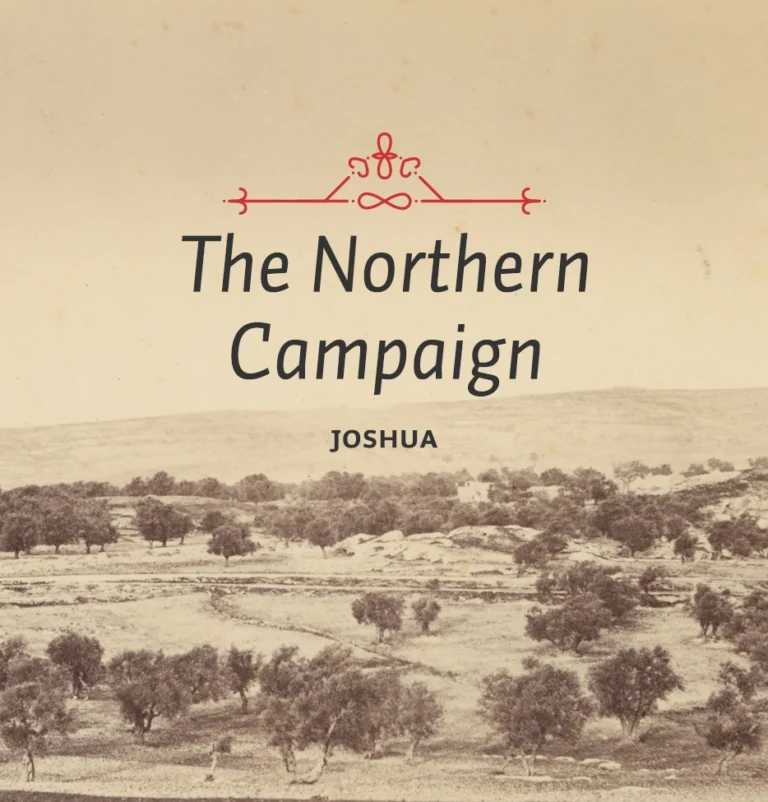
We already looked in some detail at the southern campaign. The northern one is given in even less detail than the southern one, although it is similar in many respects. Like the southern campaign, the one in the north is also waged against a coalition of kings who gathered together to try and repulse the Israelite conquest of Canaan. We’re told at the very beginning of chapter 11 that there was a king in the north, the king of Hazor, whose name was Jabin. He saw what was happening and decided to respond by getting together all of the forces at his disposal.

In our study of the southern campaign I talked about Joshua’s leadership characteristics. This story of the northern campaign reminds us of the importance of spiritual leadership. The same principles that he put into practice in his military campaigns are principles that you and I need to put into our spiritual campaigns.

In some ways, at least as his story is told to us, Joshua was not a spectacular individual. At least he did not have a lot of spectacular experiences. There were miracles, of course, but basically, Joshua was a soldier. He was told what to do, and he did it. His strength was found in that, and that kind of obedience is a great thing.

Yesterday, we listed the first thing we must do if we are to fulfill Joshua 11:15, which is to truly believe on Jesus Christ by following him as a faithful disciple. The second thing is this. In Matthew 28, at the very end of that chapter where we have the Great Commission, we’re told that if we believe on Jesus, then we have an obligation to tell other people about Him.

Jesus said in Matthew 5:20, “Except your righteousness exceed the righteousness of the scribes and Pharisees, you will in no wise enter into the kingdom of heaven.” What He is saying is that if you really are a justified man or woman, if His righteousness really has been imputed to you, if you have been made spiritually alive, regenerated by the Holy Spirit, there will be such a power in you and such a desire to please God that your good deeds will exceed the good deeds of the scribes and Pharisees.

The magnificent old man to which I am referring here in Joshua 14 is Caleb, who was Joshua’s companion and fellow soldier during all these long years of the conquest of Canaan. It’s often the case that in the presence of an outstanding leader, other people are overlooked. And it’s not because the other people are not great in themselves. Sometimes they’re even greater in some ways than the leader who’s getting all the attention. But, for one reason or another, perhaps just because he or she has a position of visibility, the leader gets the attention, and the other people are overshadowed.

Now when Numbers 13 begins to tell us about the work of the spies, it doesn’t give us very much detail as to how they went about their work. We don’t know, for example, whether they toured around in a body or whether they divided up. We might suspect that they divided up so as not to attract too much attention. One thing I suspect as I read about this is that whether they divided up or whether they went around as a group, Caleb must have expressed some particular interest in Hebron. Hebron is the only one of the cities of the land that’s described in any detail in Numbers 13.

Now it’s worth asking at this point what the secret of this man’s greatness was. In fact, it was no great secret. Caleb had total faith in God, and he gave himself to God utterly. It’s not hard to see his faith. That comes out very simply in this matter of the spies’ initial report.

The second thing that we see in Joshua 14 comes out in this word, “wholeheartedly,” which is repeated there three times (vv. 8, 9, 14). That’s the same idea that is involved in Deuteronomy 6:5, which Jesus quoted when He was asked what was the first and greatest of all the commandments. He said, “It’s that you love the Lord your God with all your heart, soul, and mind.” Because Caleb loved the Lord his God with all his heart, he served him with all his heart. And he did it through a long, long lifetime. And here at the end, he’s still doing it.

There’s a great contrast here in this story, and I’m sure it’s why it’s told at this point, right in the middle of this account of the division of the land. It’s the contrast between Caleb, who followed the Lord wholeheartedly to the very end and took the land that he’d been promised so many years before, and the people who, for the most part, failed to fully possess these possessions. Oh, they had the land. They were there. The power of the Canaanites was broken during the seven years of military conquest. All of the great cities had been overthrown. But when the land was divided up, they were to go into their individual portions of the land, subdue it, and drive the inhabitants out. And we’re told again and again in these chapters that they didn’t quite do it. They settled down, and instead enjoyed the conquest without carrying it through to completion.

Canadian Committee of The Bible Study Hour
PO Box 24087, RPO Josephine
North Bay, ON, P1B 0C7